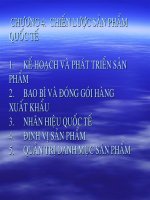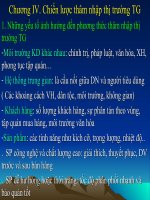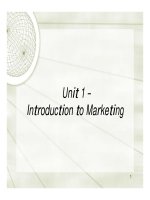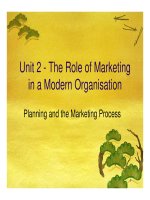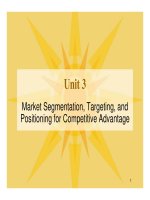Marketing quốc tế Slides BUSM2412 unit 4 s1 08 compatibility mode
Bạn đang xem bản rút gọn của tài liệu. Xem và tải ngay bản đầy đủ của tài liệu tại đây (2.76 MB, 25 trang )
UNIT 4
Consumer and business
business-toto
business market buyer behaviour:
understanding what drives
customers and how marketers use
the knowledge effectively
1
Obj
ti
Objectives
The relationship between marketing and
buyer behaviour
Model of consumer buyer decision-making
Consumer buying decision roles
Buying decision choice sets
Ways
y consumers evaluate alternatives
Post purchase behaviour
Business
us ess Buying
uy g Behaviour
e a ou
2
C
i B
h i
Consumer B
Buying
Behaviour
Consumer Buying Behaviour refers to the
buying behaviour of final consumers individuals & households - who buy goods
and services for personal consumption.
These final consumers make up the
consumer market.
The central question for marketers is:
– “How do consumers respond to various
marketing
k ti efforts
ff t the
th company might
i ht use?”
?”
3
M d l off B
Model
Buyer B
Behaviour
h i
4
Factors Influencing
g Consumer Behaviour
Psychological
•Motivation
Moti ation
•Perception
•Learning (memory)
•Beliefs & attitudes
•Personality
P
lit &
self-concept
Marketing programs
•Marketing objectives
Marketing strategy
•Marketing
•Marketing mix
Personal
•Age & lifecycle stage
•Occupation
Occupation
•Education
•Economic situation
Social
•Household type
•Reference
Reference groups
•Roles & status
Consumer
Buyers’ responses
•Product service &
category
g y selection
BUYER DECISION
•Brand selection
PROCESS
•Reseller selection
Experiences •Purchase timing &
Lifestyle
repurchase
p
intervals
•Purchase amount
Environmental influences
•Economic
E
i
•Technological
•Political
Cultural
•Culture
•Subculture
•Social Class
5
Factors
acto s Influencing
ue c g
Consumer Behaviour
6
Factors
acto s Affecting
ect g Co
Consumer
su e
Behaviour: Culture
Culture is the Most Basic Cause of a Person's
Wants and Behavior.
Subculture
• Groups of people with shared
value systems based on common
life experiences.
• Hispanic Consumers
• African American Consumers
• Asian American Consumers
• Mature Consumers
7
Factors
acto s Affecting
ect g Co
Consumer
su e
Behaviour: Culture
Social Class
• Society’s relatively permanent &
ordered divisions whose members
share similar values
values, interests,
interests
and behaviours.
• Measured by a Combination of:
Occupation Income
Occupation,
Income, Education
Education,
Wealth and Other Variables.
8
Factors
acto s Affecting
ect g Co
Consumer
su e
Behaviour: Social
Groups
Membership,
p, Reference,,
or Aspirational
Family
Most Important Consumer Buying
Organization
Roles and Status
9
Factors
acto s Affecting
ect g Co
Consumer
su e
Behaviour: Personal
Personal Influences
Age and Life
Cycle Stage
Occupation
p
Economic
Situation
Personality &
Self Concept
Self-Concept
Lifestyle Identification
Activities
Interests
O i i
Opinions
10
Factors Affecting Consumer
Behavior: Psychological
Motivation
Beliefs and
Attitudes
Psychological
Factors
Affecting
Buyers
Choices
Learning
Perception
11
M l ’ Hi
Maslow’s
Hierarchy
h off N
Needs
d
12
B
Buyer
D
Decision
i i P
Process
13
Buyer
uye Decision
ec s o Process
ocess
Step 1. Need Recognition
Internal Stimuli –
Hunger
Buyer
Recognises
a
Problem
or a
Need
Arising
From:
External Stimuli-
Friends
14
The
e Buyer
uye Decision
ec s o Process
ocess
Step 2. Information Search
Personal Sources
Commercial Sources
Public Sources
Experiential Sources
•Family, friends, neighbors
•Most effective source of
i f
information
ti
•Advertising, salespeople
•Receives the most information
from these sources
•Mass Media
•Consumer-rating groups
•Handling the product
•Examining the product
•Using the product
15
The Buyer Decision Process
Step 3. Evaluation of Alternatives
Consumer May Use Careful
Calculations & Logical Thinking
Consumers May Buy on Impulse and
Rely on Intuition
Consumers May Make Buying Decisions
on Their Own
Consumers May Make Buying Decisions
Only After Consulting Others
Marketers Must Study Buyers to Find Out
How They Evaluate Brand Alternatives 16
Types of Buying Decisions
High
Hi
h
Involvement
Low
L
Involvement
Significant
g
differences
between
brands
Complex
Buying
Behaviour
VarietyV
i t
Seeking
Behaviour
Few
differences
between
brands
DissonanceReducing Buying
Behaviour
Habitual
ab tua
Buying
Behaviour
17
B i D
Buying
Decisions
i i
Total Set - All potential products & services
that might satisfy wants and needs.
Awareness Set - Alternatives that the
consumer is aware of
Evoked (Choice) Set - Alternatives
considered byy consumers
Inept Set
Inert Set
18
The Buyer Decision Process
Step 4. Purchase Decision
Purchase Intention
Desire to buy the most preferred brand
Attitudes
of Others
Unexpected
Situational
Factors
Purchase Decision
19
The Buyer Decision Process
Step 5. Postpurchase Behaviour
Consumer’s
Expectations of Product’s
Product s Performance
Product’s Perceived
Performance
Cog
gnitive Diissonance
e
Satisfied Customer!
Dissatisfied Customer
20
Using the decision making process model,
trace a recent purchase each of you have
made. Be sure to examine each of the five
stages of the buyer decision process and
detail your experiences in each stage
stage.
What could the seller have done to make
your buying experience better?
Did you experience any cognitive
dissonance? Explain.
21
Stages in the
t e Adoption
dopt o
Process
Awareness: Consumer becomes aware of the new
product, but lacks information about it.
Interest: Consumer seeks information about new
product.
Evaluation: Consumer considers whether trying the
new product makes sense.
Trial: Consumer tries new product on a small scale to
improve his or her estimate of its value.
Adoption: Consumer decides to make full and regular
use of the new product
product.
22
Ad t C
Adopter
Categories
t
i
23
Influence of Product Characteristics
on Rate of Adoption
Communicability
Relative Advantage
Can results be easily
observed or described
to others?
Is the innovation
superior to existing
products?
Compatibility
Divisibility
Can the innovation
be used on a
limited basis?
Complexity
Is the innovation
difficult to
understand or use?
Does the innovation
fit the values and
experience of the
target market?
24
R i i th
Reviewing
the C
Concepts
t
Understand the consumer market and the major
j
factors that influence consumer buyer behaviour.
Identifyy and discuss the stages
g in the buyer
y
decision process.
Describe the adoption and diffusion process for
new products.
25



